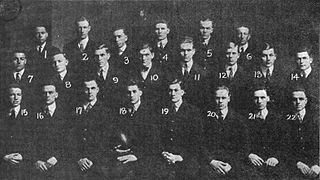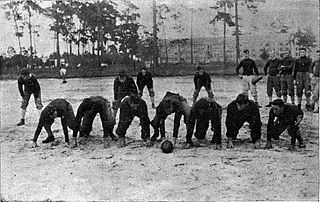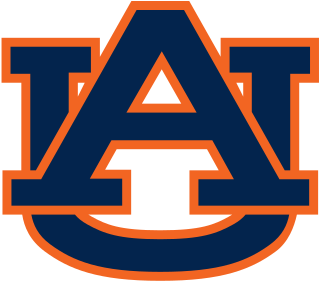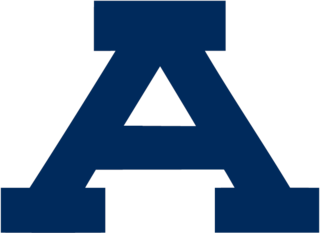Related Research Articles

Michael Joseph "Iron Mike" Donahue was an American football player, coach of football, basketball, baseball, tennis, track, soccer, and golf, and a college athletics administrator. He served as the head football coach at Auburn University, at Louisiana State University (1923–1927), and at Spring Hill College (1934).

The 1913 Auburn Tigers football team represented Auburn University in the 1913 Southern Intercollegiate Athletic Association football season. The Tigers were retroactively recognized as a national champion in 1999 by the Billingsley Report's alternative calculation which considers teams' margin of victory. The team was coached by Mike Donahue and was undefeated at 8–0, outscoring opponents 224–13.

The 1914 Auburn Tigers football team represented Auburn University in the 1914 Southern Intercollegiate Athletic Association football season. It was the Tigers' 23rd overall season and they competed as a member of the Southern Intercollegiate Athletic Association (SIAA). The team was led by head coach Mike Donahue, in his 10th year, and played their home games at Drake Field in Auburn, Alabama. They finished as SIAA Champions with a record of eight wins, zero losses and one tie and outscored opponents 193–0.

The 1912 Florida Gators football team represented the University of Florida during the 1912 college football season. The season was the fourth for George Pyle as the Florida Gators football team's head coach. Pyle's 1912 Florida Gators finished their seventh varsity football season with an SIAA conference record of 1–2 and an overall winning record of 5–2–1.

The 1996 Florida Gators football team represented the University of Florida in the sport of American football during the 1996 NCAA Division I-A football season. The 1996 season was the team's seventh under head coach Steve Spurrier. The Gators competed in the Southeastern Conference (SEC) and played their home games at Ben Hill Griffin Stadium on the university's Gainesville, Florida campus.
The 1952 Florida Gators football team represented the University of Florida during the 1952 college football season. The season was Bob Woodruff's third and most successful as the head coach of the Florida Gators football team. Woodruff's 1952 Florida Gators finished with an overall record of 8–3 and a Southeastern Conference (SEC) record of 3–3, placing sixth among twelve SEC teams.
The 1958 Florida Gators football team represented the University of Florida during the 1958 NCAA University Division football season. The season was the ninth of ten for Bob Woodruff as the head coach of the Florida Gators football team. Woodruff's 1958 Florida Gators finished with an overall record of 6–4–1 and a Southeastern Conference (SEC) record of 2–3–1, placing eighth in the twelve-member SEC.

The 1966 Florida Gators football team represented the University of Florida in the sport of American football during the 1966 NCAA University Division football season. The Gators competed in the University Division of the National Collegiate Athletic Association (NCAA) and the Southeastern Conference (SEC). In their seventh season under head coach Ray Graves, the Gators compiled a 9–2 overall win–loss record, finished 5–1 and placed third among the SEC's ten teams. Led by quarterback Steve Spurrier, the Gators outscored their opponents by a combined total of 265 to 147 and concluded their 1966 season with a 27–12 victory over the Georgia Tech Yellow Jackets in the 1967 Orange Bowl. The Gators were not ranked in the final AP Poll, but finished No. 11 in the final UPI Coaches Poll.
The 1969 Florida Gators football team represented the University of Florida during the 1969 NCAA University Division football season. The season was the tenth, last, and arguably most successful season for Ray Graves as the head coach of the Florida Gators football team. Graves' 1969 Florida Gators finished their regular season with an overall record of 8–1–1 and an SEC record of 3–1–1, placing fourth among the ten SEC teams. Florida concluded the year with a Gator Bowl victory over SEC-champion Tennessee. Afterwards, Graves resigned from the head coaching position to become the university's athletic director, and was replaced by Tennessee head coach Doug Dickey.
The 1980 Florida Gators football team represented the University of Florida during the 1980 NCAA Division I-A football season. The season was the Florida Gators football team's second season under new head coach Charles B. "Charley" Pell, and marked a remarkable one-year turnaround for the Gators from their 0–10–1 record in 1979. The winless 1979 season was the worst season in Gators history, and it was Pell's first campaign as the new head coach of the Gators, after the Gators' previous head coach, Doug Dickey, was fired in the aftermath of a 4–7 season in 1978. Pell's 1980 Florida Gators posted an 8–4 overall record and a Southeastern Conference (SEC) record of 4–2, tying for fourth place in the ten-team SEC. The Gators capped their season with a 35–20 bowl victory over the Maryland Terrapins in the Tangerine Bowl, marking the first time in the history of major college football that a winless team received a bowl bid the following season. Linebacker David Little set the career record for tackles by a Gator and was consensus All-American. Receiver Cris Collinsworth was first-team All-American. The season features the famous "Run Lindsay Run" in the close loss to national champion Georgia.
The 1990 Florida Gators football team represented the University of Florida during the 1990 NCAA Division I-A football season. The season marked the return of the Gators' Heisman Trophy-winning quarterback Steve Spurrier to his alma mater as the new head coach of the Florida Gators football team.
The 1993 Florida Gators football team represented the University of Florida during the 1993 NCAA Division I-A football season. The season was the fourth for Steve Spurrier as the head coach of the Florida Gators football team. The Gators compiled a 10–2 overall record.

The 1974 Auburn Tigers football team under the leadership of head coach Ralph Jordan completed the regular season with a record of 9–2, earning them an invitation to the Gator Bowl against Texas, which they won by a score of 27–3. They completed the season with a record of 10–2 and were ranked #8 in the AP poll and #6 in the UPI.

The 1967 Auburn Tigers football team represented Auburn University in the 1967 NCAA University Division football season. It was the Tigers' 76th overall and 34th season as a member of the Southeastern Conference (SEC). The team was led by head coach Ralph "Shug" Jordan, in his 17th year, and played their home games at Cliff Hare Stadium in Auburn, Alabama. They finished with a record of six wins and four losses.

The 1955 Auburn Tigers football team represented Auburn University in the 1955 college football season. It was the Tigers' 64th overall and 23rd season as a member of the Southeastern Conference (SEC). The team was led by head coach Ralph "Shug" Jordan, in his fifth year, and played their home games at Cliff Hare Stadium in Auburn and Legion Field in Birmingham, Alabama and Ladd–Peebles Stadium in Mobile, Alabama. They finished with a record of eight wins, two losses and one tie and with a loss to Vanderbilt in the Gator Bowl.

The 1953 Auburn Tigers football team represented Auburn University in the 1953 college football season. It was the Tigers' 62nd overall and 21st season as a member of the Southeastern Conference (SEC). The team was led by head coach Ralph "Shug" Jordan, in his third year, and played their home games at Cliff Hare Stadium in Auburn, the Cramton Bowl in Montgomery and Ladd Memorial Stadium in Mobile, Alabama. They finished with a record of seven wins, three losses and one tie and with a loss to Texas Tech in the Gator Bowl.

George Washington "Doc" Penton was an American football player and coach. He served as the head football coach at Jacksonville State Normal School in 1910 and at Troy State Normal School from 1911 to 1912, compiling a career college football coaching record of 8–4–3. Penton played college football at Auburn University as a guard and fullback from 1907 to 1909. He was the brother of fellow football player and coach, John Penton.
The history of Florida Gators football began in 1906, when the newly established "University of the State of Florida" fielded a football team during its first full academic year of existence. The school's name was shortened to the University of Florida in 1908, and the football team gained the nickname "Gators" in 1911. The program started small, usually playing six to eight games per season against small colleges and local athletic club teams in north Florida and south Georgia. The Orange and Blue developed early rivalries with the Stetson Hatters from nearby Deland and Mercer Bears from Macon. During the 1910s, Florida began playing a wider range of opponents from more established football programs across the southeastern United States and faced off against several future rivals - such as Georgia, Georgia Tech, South Carolina, and Auburn - for the first time.

The 1950 Senior Bowl was a college football exhibition game featuring players from the 1949 college football season and prospects in the 1950 NFL Draft. The inaugural edition of the Senior Bowl was played on January 7, 1950, at Gator Bowl Stadium in Jacksonville, Florida. The teams were coached by personnel from the National Football League (NFL); Bo McMillin of the Detroit Lions for the North, and Steve Owen of the New York Giants for the South. The game was broadcast on the Mutual Radio Network. After the North took an early 13–0 lead, the South came from behind for a 22–13 victory. South quarterback Travis Tidwell of Auburn completed 13 of 19 passes for 246 yards and was named game MVP.
References
- ↑ 2011 Auburn Football Fact Book Archived March 4, 2016, at the Wayback Machine
- ↑ Skotnicki, Mike (June 28, 2013). "100 Year Anniversary: The Top 10 Players on Auburn's 1913 National Championship Team".
- ↑ "Orange and Blue, 1913 October 03".
- ↑ "Clipped From The Tampa Times". December 6, 1923. p. 6 – via newspapers.com.
- ↑ 1957 Gator Bowl: Texas A&M vs Tennessee (12/28/57)
- ↑ "Clipped From Lubbock Avalanche-Journal". December 24, 1939. p. 6 – via newspapers.com.
- ↑ History 1944-1969 of Blue Cross of Florida, INC.